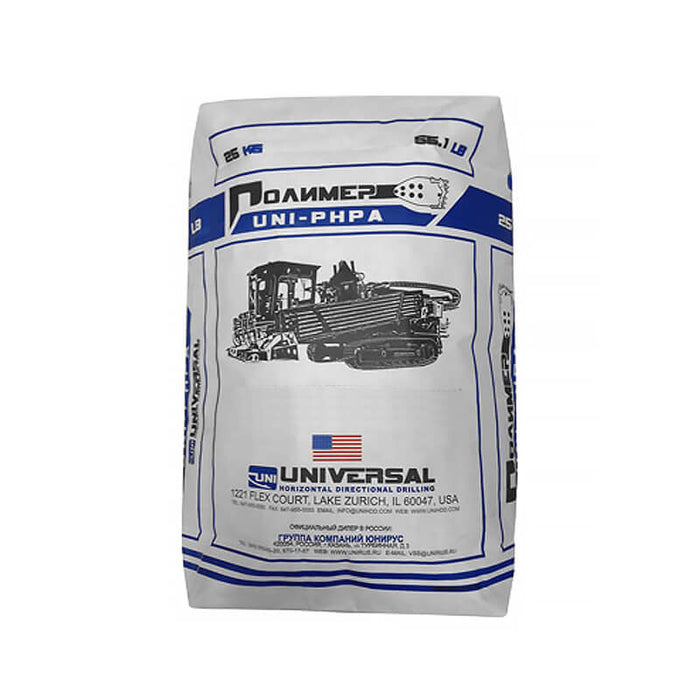
UNI-PHPA HDD Polymer
UNI-PHPA-partially hydrolyzed polyacrylamide is used for drilling in cohesive soil (inactive and active clay) for the purpose of clay fraction encapsulation, well cleaning and prevention of adhesion on the tooling;
UNI-PHPA is a readily dispersible product designed to provide cuttings encapsulation and shale stabilization.
It is formulated for easy mixing with improved dispersion to eliminate “fish eyes.” This is beneficial when rapidly mixing either large quantities or high concentrations of the polymer where good mixing equipment is unavailable. UNI-PHPA acts as a viscosifier, friction reducer, and flocculant. It also provides some fluid-loss control.
Typical Physical Properties
Physical appearance ………………………………White, granular powder
Odor ………………………………………………………Slightly hydrocarbon
Specific gravity ……………………………………………………..1.25-1.40
pH (1% solution) …………………………………………………………….7.7
Bulk density ……………………………..40-461b/ft3 (641-737 kg/m3)
Nature of charge ………………………………………………………. Anionic
Activity ……………………………………………………………………. >90%
Applications
Uni-PHPA provides excellent cuttings encapsulation and improved wellbore stability. Typical concentrations of Uni-PHPA are 0.25 to 1 lb/bbl (0.71 to 2.85 kg/m3). It can be used in clear-water, solids-free drilling fluids.
Addition Method
Uni-PHPA can be mixed directly into the active mud system. It can also be premixed at higher concentrations in a separate pit or chemical barrel, then blended into the active system.
Advantages
- Readily dispersible and does not form “fish eyes”
- Excellent cuttings encapsulator limits cuttings dispersion
- Provides improved shale stabilization
- The powdered material has significantly lower toxicity than invert-emulsion, liquid polymers
- Highly concentrated product (>90% activity) reduces transportation costs and storage space requirements
- Aids in preventing balling on the bit, stabilizers and bottom hole assembly by coating and lubricating solids
- Enhances removal of drill solids
- Can be used to viscosity clear-water and low-solids drilling fluids
Limitations
- Severe flocculation can occur during the initial treatment of Uni-PHPA in a non-dispersed mud system. Flocculation causes high viscosity until all of the solids are coated. Uni-PHPA mud systems use low concentrations (<151b/bbl [<43 kg/m3 ) of Uni-Gel viscosifier to reduce this interaction.
- Calcium-sensitive-begins to precipitate when the calcium concentration exceeds 300 mg/L.
- pH-sensitive with an optimum pH range of 8.5-10.5. At levels above this range, hydrolysis can convert acrylamide into acrylate and release ammonia.
- Temperature-stable to approximately 350°F (177°C).
- Subject to shear degradation of its viscosity and can lose its ability to viscosity. Cuttings encapsulation and shale stabilization are not affected.
Toxicity and Handling
Bioassay information available upon request.
No special requirements are necessary for handling and storage. Avoid inhalation of dust. A dust respirator and goggles are recommended if mixing in an enclosed area.
Storage
Store in a dry location away from sources of heat or ignition, and minimize dust.
